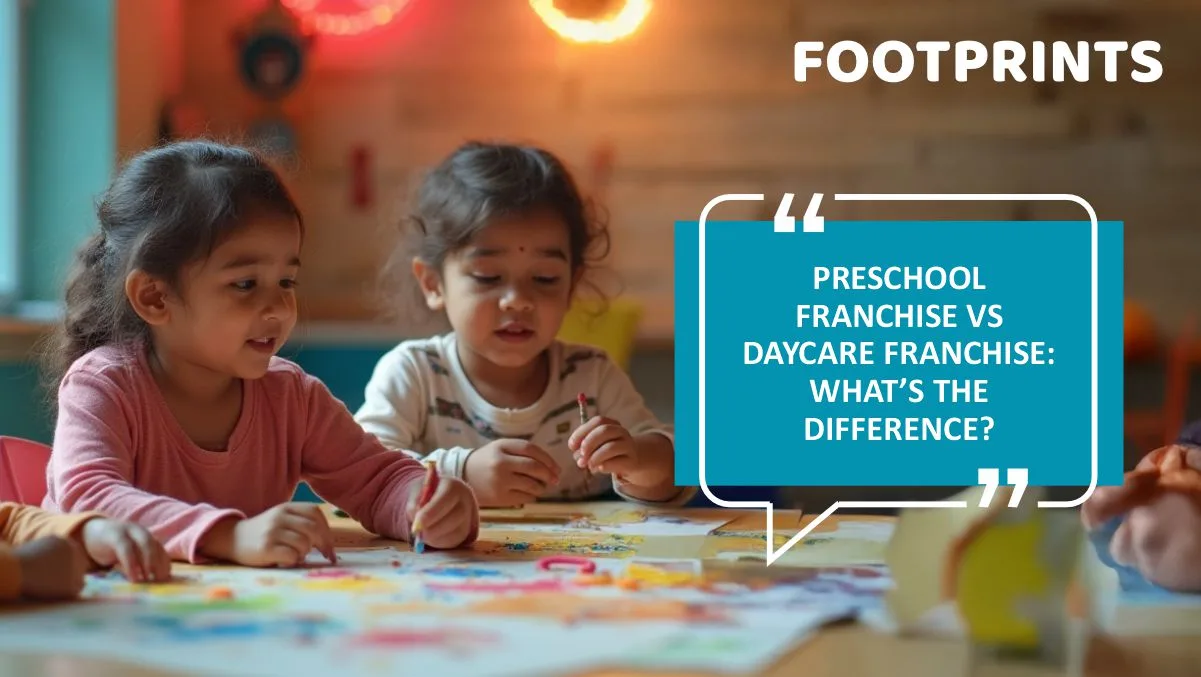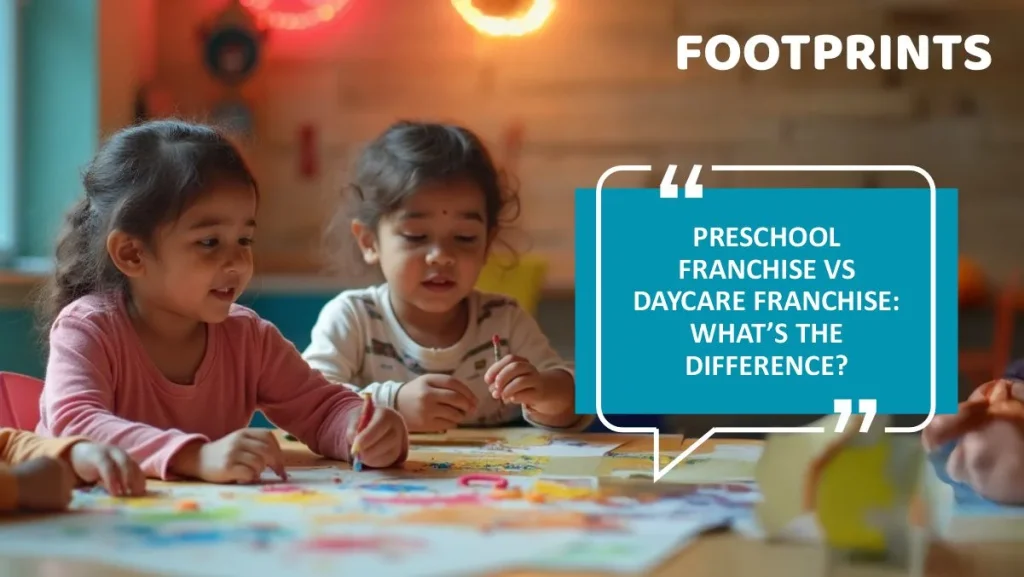

Are you passionate about working with children and eager to make a lasting impact in their lives? If so, early childhood education offers a meaningful path to transform your passion into a rewarding profession. Research shows that 90% of our brains develop by the time we are 5 years of age. During this time, a child’s brain forms neural connections and pathways at a faster pace than at any other point in life. These early experiences, particularly in a stimulating environment, have a significant impact on shaping the brain and influencing a child’s development in various areas, including cognitive, social, and emotional skills.
Committed to offering meaningful experiences to children, the next decision you need to take is whether you want to set up a preschool franchise or a daycare franchise. While the two terms are often used interchangeably, they serve different needs, follow different models, and cater to distinct age groups and developmental goals. Let us deep dive into what the difference between the two is and what does it means for you at the commercial level
Difference between daycare and preschool franchise
Core Purpose
Simply put, a preschool franchise focuses primarily on early childhood education, offering learning programs for young children. As a passionate individual, it may not work well for you to take on the entire process of setting up a preschool by yourself. It is a mammoth task that, among other things, involves setting up the infrastructure, hiring and training staff, developing a curriculum, marketing the school and more. Instead, it works far better that you take up a franchise of an established preschool brand that can handhold you through the entire process.
A daycare, on the other hand, offers childcare services, including extended hours, catering to a broader age range and the needs of working parents. Once again, seeking a franchise of a leading daycare works far better since you are handheld through not just the process of setting up but also all the necessary protocols to run it successfully.

Age Range
A preschool typically caters to children in the age group of 2-5 years. When it comes to a daycare, the age range is broader as it caters to the requirements of working parents who need a safe space that offers avenues of holistic growth for their children.
Hours of Operation
Typically, play schools work for 3-4 hours a day. In case of a daycare franchise, the hours of operation are longer to cater to working parents.
Curriculum and Learning Approach
A preschool franchise in India comes with a well-defined and scientifically developed curriculum. Teachers are trained to implement age-appropriate learning plans that cater to holistic growth, track development, and prepare children for formal schooling.
A daycare franchise, on the other hand, may or may not include a structured learning component. The key focus is on a safe environment where the child is offered essential services such as food and care. Some premium daycare brands offer enrichment activities like music, dance, storytelling, and language development.
Staffing and Training Requirements
Running a preschool requires trained educators, often with certifications in early childhood education, child psychology, or specific pedagogical approaches. You’ll need to maintain teacher-student ratios, plan lesson structures, and evaluate learning outcomes.
A daycare, meanwhile, requires caregivers and attendants skilled in child safety, nutrition, and emotional comfort. While training is important, the emphasis is less on academics and more on interpersonal warmth, hygiene, and responsiveness.
Market Demand And Growth Potential
As far as the market demand and growth potential go, both preschools and daycare centres are witnessing an increase in demand. If the growing emphasis on early education is driving growth of preschools, daycare centres are benefiting from an increasing participation by women in the workforce that makes reliable childcare services an absolute essential.
Profitability
As far as the profitability comparison of the two is concerned, play schools are seen to be the more profitable. This is on account of several factors:
- With a structured curriculum, a nurturing environment and more, you are typically able to charge a higher fee per student
- Shorter operating hours lead to lower operating overheads
Essentially, then, your choice of preschool or daycare franchise needs to be guided by factors such as the areas you want to focus on, the kind of hours you want to put in, the leeway you have in terms of profitability and more.
Whether you choose to go with a preschool or daycare franchise, you will need hand-holding in terms of:
- Training and onboarding
- Marketing support
- Operational guidance
- Curriculum and material
- Software for managing attendance, fees, and communication
Some brands will offer you the best of both worlds, offering you both the above options.
It is imperative that you make the choice of brand carefully. Due diligence in areas such as brand reputation and the kind of support offered will go a long way in determining success. At Footprint Childcare, we take great pride in the fact that we have emerged as preferred parenting partners for parents across the country. Our scientifically developed curriculum, focuses on overall child development and safety, is only one of the factors that have endeared us to parents. Additionally, we have a very high success rate with our franchise partners.
Feel free to reach out to us if you are passionate about making a difference in the space of early education.
FAQs
1. What are the benefits of preschool education?
It nurtures curiosity, encourages routine, improves attention span, and helps children adjust to formal school environments with greater confidence. Besides, it also builds foundational skills in language, math, and social behavior through structured play and interaction.
2. What skills should a 3-year-old have before starting preschool?
Most 3-year-olds should be able to communicate basic needs, follow simple instructions. Toilet training and basic self-help skills like eating independently are also beneficial but not always mandatory.
3. What is the difference between a preschool and a daycare?
A preschool focuses on early learning and a structured curriculum for children aged 2–5. A daycare provides safe supervision and care for infants to children up to 6–12 years, often covering longer hours to support working parents.
4. Can a preschool also function as a daycare?
Yes. Many centers offer a hybrid model – preschool in the mornings and daycare services in the afternoon. This approach helps maximize infrastructure usage and meet both educational and childcare needs of parents.
5. Is a preschool franchise profitable?
Yes, especially in urban and semi-urban areas where early education is prioritized. A reputed franchise brand can offer strong returns with proper location, marketing, and adherence to academic quality.
6. What qualifications are required to run a preschool or daycare franchise?
While formal education in early childhood care is a plus, most franchises provide training. The key is a passion for children, strong communication skills, and a willingness to follow brand standards and compliance guidelines.
7. Do preschools follow a standard curriculum?
Not all of them do. It is best to go with a reputed preschool that has a scientifically developed curriculum that ensures holistic growth of a child.
8. How do daycares ensure child safety?
Reputed daycares implement safety protocols, including background checks for staff, CCTV surveillance, child-proofed spaces, emergency medical kits, and staff trained in pediatric first aid and CPR.
9. Which is better: opening a preschool or a daycare?
It depends on your goals. Choose a preschool if you’re passionate about education and want fixed, academic-hour operations. Choose a daycare if you prefer full-day care, steady year-round revenue, and flexibility in programming. You can also opt for both.
Shubham is an SEO expert dedicated to helping businesses to thrive in a digital landscape. His innovative marketing campaigns have significantly boosted the organization’s reach and engagement.

